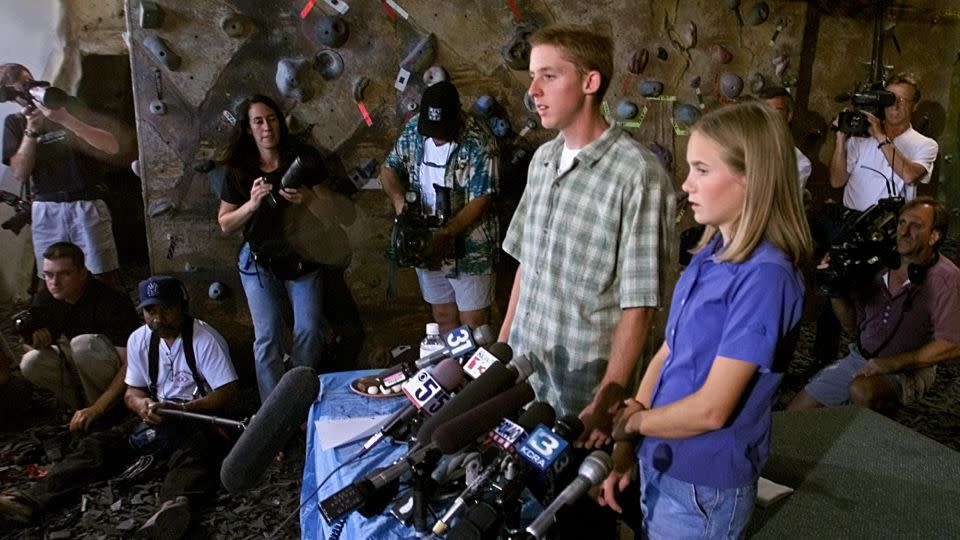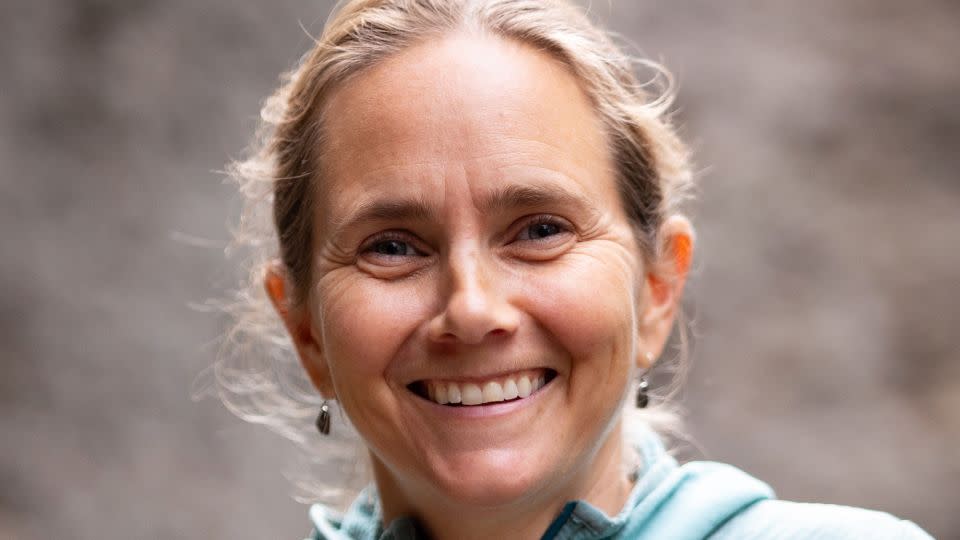She was kidnapped but ‘embarrassed’ to feel traumatized. Now, this climber is learning to be vulnerable
Weeks after being taken hostage by captors from the Islamic Movement of Uzbekistan, American climber Beth Rodden was back home – but plagued by nightmares of her ordeal.
Then 20, and one of the most revered climbers of her generation, Rodden was kidnapped at gunpoint alongside her then boyfriend, Tommy Caldwell, and two other climbers while on a climbing trip in Kyrgyzstan in 2000.
The ordeal lasted for six days, with the young group forced to drink water from murky puddles and survive on a few energy bars as they were marched through the cold, wet mountain terrain, sleeping under boulders as their guards evaded capture.
The team endured the horror of a fellow captive – a young Kyrgyz soldier who had also been taken – being shot dead nearby by the captors, who were part of the militant group which was based in Tajikistan and focused on a bloody incursion into Kyrgyzstan at the time.
Rodden, the only woman in the group, also feared sexual assault and had the added horror of knowing that one of her captors regularly masturbated within close proximity to her.
Eventually, after their captors split up to resupply, the American group managed to escape after Caldwell pushed their single remaining guard off a cliff, which the team presumed killed him. They later discovered the guard survived.
On their return to the US, Rodden was baffled to find that people within the climbing community were inclined to “celebrate” their ordeal.

“When we came back instead of people asking, ‘Are you OK? How are you doing?’ it was more celebrated because a lot of climbing and climbing stories back then were all about skirting death and having a harrowing tale to go along with it. And obviously, this was a harrowing tale,” Rodden tells CNN Sport 24 years on from the incident.
“So when people kind of celebrated it, I didn’t really have language to talk about how I was being affected,” Rodden, a decorated and revered climber, whose resume includes three free ascents of Yosemite’s monolith, El Capitan, as well as establishing some of climbing’s hardest routes, adds.
Rodden struggled with insomnia and nightmares, and although she went to a few therapy sessions she says she didn’t really open up.
“I was honestly a bit embarrassed that I wasn’t just getting back up on that horse easily,” Rodden, who has completed some of the world’s toughest big wall climbs, tells CNN. “Early on there wasn’t much room for any conversations about fear. It was seen as a weakness.
“If you said that you were scared of heights or scared of a climb or something like that, it was really seen as a weakness. I don’t know if that really served me well because it’s not like I actually worked on or understood my fear at all. I just kind of shoved it down,” she explains.

As she got older, this approach no longer worked for her.
“I started to just try and talk about things that I had struggled with, you know, and really shed a light on that and once I started to do that, a lot of people reached out and said, ‘Oh, I feel that way too.’
“When I was a teenager, instead of just reading the shiny, packaged, typical hero’s journey, if I had read a book that kind of showed all the nuance and all the messiness of people’s worlds, it would have given me a little bit of comfort away from perfectionism,” she explains.
Rodden reflects on her experiences in her new book, “A Light Through The Cracks,” which releases May 1.
‘A more inclusive community’
Although Rodden was a high achiever following her return to the US, scaling some of what are still considered to be the hardest routes in climbing, the trauma of the incident remained.
She married and later she and Caldwell divorced. And, by her own admission, she struggled with feelings of guilt, fear and inadequacy.
It’s also clear that the sport which has given her so much has also taken a toll on Rodden, who says she has struggled with eating issues and a warped self-image for most of her career.
“I had heroes and mentors who helped me – they lost weight before competitions, commented on food that I was eating. I remember this one [time] where I ordered two bagels and cream cheese and they said ‘You’re never gonna get up anything if you eat that.’ It wasn’t direct, like, ‘You’re fat.’

“But there was just all this background noise and chatter and conversations that clearly led me to believe that being skinny, unhealthily so, was the way to be a good climber and to gain sponsorships and be in magazines.”
“I didn’t see it as a problem because I just saw it as a tool that let me achieve.”
However, with conversations around mental health, body image and trauma becoming more common and accepted in the climbing world, Rodden says things are changing for the better.
She tells CNN that therapy has helped her recovery.
“At one point, I thought healing from trauma would be a box I checked, that I would cross a finish line at some point. But for me, I’m realizing it’s an ongoing thing in my life, it ebbs and flows, and I now think it’ll be something that I come back to again and again,” she explains.
Rodden also reflects that the climbing community feels like a more inclusive space than it was decades ago.
“There’s become more room for people like mothers to be climbing, or people that are not just 20, you know? People that are postmenopausal that are older, younger – I feel like it’s just becoming a more inclusive, well-rounded community,” she added.
“I feel like I was really proud of free climbing El Cap a few times and some of the first ascents that I did in Yosemite and Smith Rock [in Oregon]. It’s taken me a long time to look back and appreciate that, because when you’re in the moment, you’re like, “This is just what I do. And I’m just barreling ahead and ticking things off.”
“But now looking back, I’m like, Oh, that was that was like pretty cool.”
Having climbed for 30 years, the magic hasn’t worn off yet, and Rodden hopes to be climbing for decades more.
“Any day I can go climbing, that gets me excited.”
For more CNN news and newsletters create an account at CNN.com
